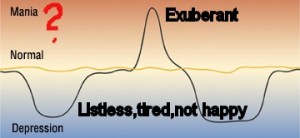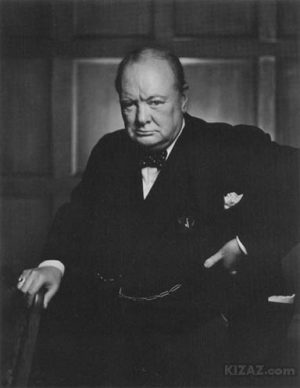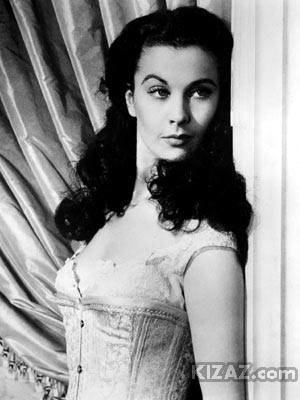 Sinatra described himself as ‘an 18 karat manic-depressive’, and claimed he had ‘lived a life of violent emotional contradictions’. “I have an over-acute capacity for sadness as well as elation,” he added, hinting at one of the classic symptoms of bipolar disorder.
Sinatra described himself as ‘an 18 karat manic-depressive’, and claimed he had ‘lived a life of violent emotional contradictions’. “I have an over-acute capacity for sadness as well as elation,” he added, hinting at one of the classic symptoms of bipolar disorder.
As I have said in other articles before, we have several cycles going on in our lives.
What I didn’t say about the cycles is this: earliest incidents of disappointment, pain, abuse, loss may create them. The length of the cycle is fixed, and it is correlated to the age when the incident happened.
By the way, cycles are patterns…
OK, after this preamble, I’d like to share a cycle I haven’t spoken about: the cycle in which I lose the will to live. I lose enjoyment. It’s not fun.
I am probably at the deepest point of the cycle right now. And until a few minutes ago, life was showing up and an is… All life held, success, money, love, relationships showed up as: this is how it is, there is nothing you can do about it.
As you see, even at a vibrational level of above 900, one is still part of this world…
in fact, 900 is only 47% of the way to the highest a human can go and still be called human…
The difference between 900 and the under 200 where most of you are, is that the moment I could get in touch with a sense of loss, sadness, (tears in the eyes, tight throat) I could ask a different question:
Could I be happy with exactly how it is, without anything having to change for me to be happy?
Now, two things about that: I declared hitting bottom. Who knows where bottom is. I remember bottom of this same cycle being in a psych ward heavily medicated. So this, by no means was “real” bottom… there is no real bottom, even death may not be a real bottom.
So the question came from the sadness that all chance is lost if I die. I have been playing with the idea of willing myself to die. Hey… it’s one of the symptoms of this cycle, don’t get caught up in it… please. You’ll lose the lesson if you do.
So the first step was to declare bottom.
And the second step, in the loss of all hope, all hope for change, for rescue, for divine intervention, the question came: could I be happy with myself and my world, exactly the way it is, and exactly the way it isn’t?
Now, this is very advanced stuff, because with that question you pull ALL POWER back to yourself. You become 100% cause. Nothing and no one has power over you, nothing and no one has the power to call the shot of how it is.
This is where I am now.
In another article I’ll report on what I did next…
The darkness has disappeared, but without the next step it will come rushing back… Guaranteed.
PS: that is why it is so important for people whose attachments are pulled to join the Reclaim. Without actions consistent with the “new reality” it goes back to how it was… faster than you can blink.
If you are one of those who didn’t join Reclaim, would you care to share?
You can also come to the Wednesday Open Mic session: I’d love to hear from you.
Interesting reading.
I found an article about some celebrities with obvious highs and lows.
Ten Amazing People Who Were Depressed
For those who suffer it, depression is a tricky subject to be open and frank about. And yet a surprising number of famous and brilliant people are known to have suffered from debilitating mental issues, through which they did their best to maintain as calm and ordered a life as they could manage.
Here are 10 of the most amazing sufferers of depression, many of whom suffered in silence.
 Abraham Lincoln
Abraham Lincoln
Undeniably one of the most famous men ever to have lived, Abraham Lincoln suffered from what would now probably be diagnosed as bipolar disorder throughout his life. His reputation for carrying a sullen demeanour with him wherever he went was simply put down to a melancholy, serious character, which doubtless helped add to the gravitas that propelled him to the job of 16th President of the United States.
Lincoln suffered many losses during his life which only added to his sadness; his much-loved mother Nancy died when he was just 9 years old, his son Edward died aged just 3 years old and another son, Willie, aged 11, both before Lincoln’s own death. In an insightful (if thoroughly misguided) remark when asked where he was going when leaving a room in the build-up to his 1842 wedding, Lincoln replied: “To hell, I suppose.”
 Winston Churchill
Winston Churchill
The life of a statesman is a tough one for sure, but few had it tougher than Winston Churchill.
His ultimately successful attempts to hold Britain together during the Second World War, following an already long army and Parliamentary career to that point, have seen Churchill declared one of the nation’s greatest sons on countless occasions, but the man himself bore praise with difficulty.
In a recent biography of Churchill, current Conservative politician Boris Johnson claims Churchill’s prolific writing output was so impressive in part because he scribbled to keep depression at bay. According to Johnson: “His creative-depressive personality meant that writing (or painting, or bricklaying) was a way of keeping the ‘black dog’ of depression at bay. He wrote for that sensation of release that comes with laying 200 bricks and writing 2,000 words a day.”
 Mark Twain
Mark Twain
Another man who perhaps wrote to keep the ‘black dog’ from his door was Samuel Langhorne Clemens, better known as Mark Twain.
Despite the majority of his work placing him in the ‘humour’ section of the library, Twain’s work was often made darker by his knowledge that terrible things can and do tend to happen in life. He knew great loss himself; he outlived his wife and two of his children, with daughter Jean drowning in a bathtub at her father’s home following a heart attack thought to be related to her epilepsy.
For Twain himself this was a final grief he could not himself survive, and he died four months later. In a final flourish his end coincided with what he had long predicted – the return of Halley’s Comet, which had last visited Earth the year of Twain’s birth.
 JK Rowling
JK Rowling
Another writer who has battled depression is Harry Potter creator JK Rowling. Whether you adore or ignore the tales of the boy wizard, it’s still surprising that the author of the best-selling book series in publishing history has faced depression all her life. In 1993, with her life at a low ebb following divorce and literary rejection, Rowling was diagnosed with clinical depression and contemplated suicide.
Even when success did come, she sudden and complete transformation of her life, most notably in terms of the sudden wealth which led to her receiving begging letters from charities and members of the public day after day, left her feeling desperate to help but overwhelmed. “Everything changed so rapidly, so strangely,” she said. “I knew no one who’d ever been in the public eye. I didn’t know anyone – anyone – to whom I could turn and say, “What do you do?”
 Isaac Newton
Isaac Newton
One of the most famous men in science has to this day a reputation for having been a brutally cantankerous man, often virtually impossible to get along with, though at other times he could be quite approachable. Modern-day commentators see this as a sign of bipolar disorder, and he is known to have suffered fits of depression throughout his life and to have reacted violently to any threat to his work or reputation.
His turbulent childhood may have played a part; Newton’s father died when Isaac was just three months old, and when his mother was remarried to a clergyman named Barnabus Smith, who Newton despised throughout his life, Isaac was sent to live with his maternal grandmother. At one point Newton wrote a list of sins committed during his early life, and among them was: ”Threatening my [step]father and mother Smith to burn them and the house over them.”
 Frank Sinatra
Frank Sinatra
The tendency for entertainers to suffer from depression is clear; being in and out of the spotlight and constantly craving attention and approval are either a cause of symptom in many cases. Frank Sinatra is one such sufferer, though he was rarely out of the spotlight during his lengthy career.
In an interview in Playboy in 1963, Sinatra described himself as ‘an 18 karat manic-depressive’, and claimed he had ‘lived a life of violent emotional contradictions’. “I have an over-acute capacity for sadness as well as elation,” he added, hinting at one of the classic symptoms of bipolar disorder.
 Buzz Aldrin
Buzz Aldrin
The sheer insignificance of life on this spinning ball of rock must be hammered home to an astronaut the first time he looks back on the planet he has left. For Buzz Aldrin, member of the famous Apollo 11 moon landings mission, the trouble began when he returned to Earth and were magnified when he tried to deal with his retirement from the space game.
In his 2009 book ‘Magnificent Desolation: The Long Journey Home from the Moon’, Aldrin explains how the relentless touring with NASA to discuss the moon landings around the country led to a spreading feeling of personal desolation, depression and subsequently alcoholism.
Things became particularly bad for Aldrin around the time of his 1974 divorce from wife Joan: “I found that I could not make even the simplest decisions. I moved from drinking to depression to heavier drinking to deeper depression. I recognized the pattern, but I continually sabotaged my own efforts to do anything about it.”
Comedians perhaps suffer the highest ratio of depressives to non depressives among their number. Countless comedy stars have battled demons throughout the last few decades, from Lenny Bruce to Tony Hancock and seemingly at least the cast of the super-silly ‘Carry On’ film series.
Perhaps the most famous sufferer was Spike Milligan, the British comedian who began his career as Gunner Milligan during World War II, entertaining fellow troops while hiding his understandable fear of war, misery at the death of comrades and the surprising levels of boredom he experienced during overseas campaigns.
His troubles are brilliantly and hilariously documented in his series of memoirs, beginning with 1971’s ‘Adolf Hitler: My Part in His Downfall’. Throughout his life he was candid about his illness: “Something has happened to me, this vital spark has stopped burning – I go to a dinner table now and I don’t say a word, just sit there like a dodo. Normally I am the centre of attention, keep the conversation going – so that is depressing in itself.”
 Jean-Claude Van Damme
Jean-Claude Van Damme
Admittedly it is stretching the ‘amazing’ tag to apply it to the Muscles from Brussels, but it’s certainly surprising to think of a man who has had such a varied career in sport and acting, and latterly self-deprecating beer commercials, suffering from depression. The famous Belgian was diagnosed with rapid-cycling bipolar disorder in 1998, at a point in his life when his acting career had started to slump, he had taken to cocaine in a massive way and he was suffering severe suicidal thoughts.
Having started to take medication for the condition following the diagnosis, Van Damme found himself more able to cope with his fame and willing to discuss his earlier troubles. “When I was young, I was suffering those swing moods”, he said in 2011. “In the morning, the sky was blue, and to me, the sky was black. I was so sad.”
 Vivien Leigh
Vivien Leigh
With no disrespect to Van Damme, Vivien Leigh was a somewhat brighter star in the acting firmament, but no less troubled for all that. Leigh blazed through life, playing a huge variety of roles opposite the leading men of the day, with many of whom she had relationships.
But while Leigh was regarded as one of the most beautiful and remarkable actresses ever to have lived, she continually suffered severe bouts of depression, which would hit with such violence she was often forced to rest for weeks on end. A 1945 miscarriage hit her hard, culminating in a physical attack on co-star Laurence Olivier and a major mental breakdown. Similar events peppered her life until its untimely end, from tuberculosis, at the age of 53.

